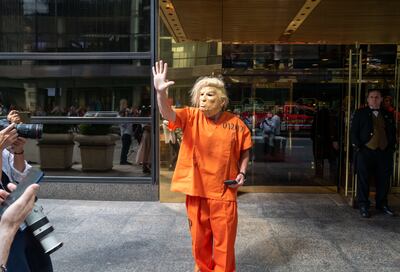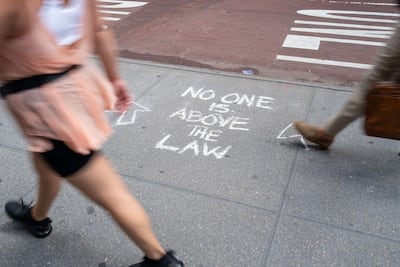Donald Trump poses a unique question for the American system: when will the line be drawn? Republican voters seem to not be troubled by that question, despite endless scandals and neither are the Party's leaders. Their nearly unanimous protection twice prevented the impeachment process from holding the former US President accountable.
Now the legal system, in the form of multiple criminal investigations in various jurisdictions on a range of potential charges, must grapple with the question of whether any aspect of the American system can effectively respond to his transgressions.
That question has been thrown into stark relief by the August 8 execution of a search warrant by the FBI at the former president’s membership club in Florida searching for highly classified government documents that Mr Trump allegedly improperly removed from the White House and has been refusing to surrender to the National Archive, which is the lawful repository of presidential papers. The Justice Department alleged three potential crimes, including violation of the Espionage Act, it was able to persuade a judge it had probable cause to suspect were being committed related to withholding the documents.

It's unlikely but possible that the Justice Department’s main aim was to retrieve the papers, some of which reportedly are related to nuclear secrets, among other exceptionally sensitive topics. Still, it appears Mr Trump is potentially in serious legal jeopardy in this matter, particularly since the Archive had attempted for over a year to retrieve the documents, and one of his attorneys, Christina Bopp, reportedly signed a letter attesting that all classified documents had been returned before the August 8 operation.
All told, over 300 classified documents, totalling over 700 pages, have reportedly been recovered from Mr Trump, and there are indications the government is not satisfied that all presidential records that belong to the public have been returned.
Mr Trump is also potentially liable for serious charges related to his efforts to overturn the 2020 election and the January 6 insurrection. And an investigation in Georgia into his efforts to convince state officials to miraculously "find" him 11,780 votes, exactly the number he needed to win the state, is a third, and in many ways perhaps the most dangerous, investigation that could easily lead to serious criminal charges against the former president. In addition, his company, although not Mr Trump personally, appears to be in serious legal jeopardy in New York State for allegedly routinely cooking the books on the value of its properties.
The conundrum that all these cases raise is that any indictment, trial and potential conviction of Mr Trump would likely set off an unprecedented firestorm of outrage, and very likely violence, on the political right. Yet the essence of the American system – at least in theory – is that no one is above the law. Despite that, there are established traditions that make exceptions for presidents.

A Justice Department policy, which appears oddly immutable, holds that no sitting president can be charged with a federal crime while in office. This is usually explained as necessary for a president to continue to function effectively without the burden of mounting a vigorous legal defence. Special Counsel Robert Mueller cited this policy when he refused to say whether his investigation found Mr Trump had obstructed justice regarding Russian interference in the 2016 election.
Gerald Ford added another layer of impunity by pardoning Richard Nixon in 1974 for all federal crimes he may have committed as president, mainly abuses of power related to the Watergate scandal. Ford said it was necessary for the country to heal after its "long national nightmare".


The reaction to the FBI search warrant on the political right was infuriated and frequently hysterical. It was unanimously described as a politically motivated attack by Democrats and strengthened Mr Trump's grip on the party. Calls to "defund the FBI," hold its leadership “accountable,” and effectively dismantle the national police were rampant. One Trump supporter was killed during an armed attack on an FBI office in Ohio.
What's notably missing among almost all Republicans is any concern about why Mr Trump decided to essentially make off with highly classified government documents, why he refused to return them, and why the FBI felt obliged, after numerous failed efforts, to take such drastic action to recover them.
The impulse to support Mr Trump supersedes even national security. He once boasted he could shoot people in public and not lose voters. This alarming degree of impunity appears effectively confirmed.
So, the legal system, ranging from the Justice Department and federal judges, as well as state-level prosecutors and courts in Georgia and elsewhere, must confront the reality that holding Mr Trump accountable, even for the most outrageous unlawful conduct – potentially including seeking to overturn elections and stealing hundreds of classified and highly sensitive government documents – will likely prompt an unprecedented wave of fury and quite possibly significant political violence. It could also prompt incensed Republicans, convinced that this is all crude political payback rather than professional law enforcement, to initiate political prosecutions of their own as soon as they get the opportunity, just as they are now loudly threatening.
Everyone sensible, therefore, is correctly urging the utmost caution. Clearly the search warrant needed to be an unavoidable final effort to retrieve extremely sensitive documents, which it certainly seems to have been.
Some are even suggesting that legitimate prosecutions of Mr Trump should simply be avoided because of these probable negative consequences. Others are urging US President Joe Biden to be prepared to issue him a Ford-like pardon and spare the country the inevitable convulsions. But these are terrible ideas.
The justice system may be the last, best hope for finally drawing an effective line against Mr Trump's transgressions. The voters did that in November 2020, but he and his followers, including a vast majority of Republicans, simply refuse to accept the truth of his election defeat.
Republicans appear willing to nominate Mr Trump for president again even if he is indicted for serious crimes, including threatening national security. If he insists on running for office from the dock, or even a prison cell – as some US mayors have in the distant past – so be it.
If any prosecutors have a solid criminal case to make against him on serious charges, the line must finally be drawn. The aura of impunity surrounding sitting and former presidents, especially Mr Trump, is toxic and corrosive to the constitutional order. Smashing it may be dangerous but it is a badly needed, long-overdue corrective.


